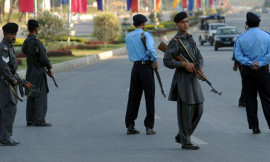
The arrest of former Inspector Abid Boxer, once known for his tough stance against 'hardened criminals' in police encounters during the late '90s, has raised serious concerns about the transformation of law enforcement officials into alleged perpetrators of crime.
Boxer, who served with the Organised Crime Unit (OCU), commonly known as CIA, is currently facing allegations related to land grabbing, extortion, and connections with criminal elements both in the city and abroad.
His arrest was officiated by over 60 police officers, led by DSP CIA Iqbal Town Muhammad Ali Butt, DSP OCU Civil Lines Rashid Amin Butt, and Inspector Majid Bashir.
They conducted a raid at his residence in Model Town, acting on information about proclaimed offenders (POs) and hardened criminals.
According to the police, as the officers entered Boxer's house, he, along with his armed private guards and the proclaimed offenders, offered resistance and assaulted the police party.
Subsequently, three separate FIRs emerged in various police stations.
One FIR was registered at Faisal Town police station, accusing Boxer of offering resistance and escaping from police custody after snatching a police rifle.
Another FIR filed at Data Darbar police station accused him of threatening a police officer who was pursuing a murder case against him in court. The third FIR pertained to the abduction of a hotel owner for extortion.
Despite the arrest, OCU/CIA initially denied having Boxer in custody, prompting his wife to approach the Lahore High Court to produce him. Later, it was revealed that he had indeed been apprehended in Kasur.
As Boxer was remanded for seven days in police custody on physical remand, announcements were made in mosques across the city, urging people to come forward with any complaints against him related to land grabbing, extortion, or other charges. Posters with similar messages also appeared in different parts of the city.
The story of Inspector Abid Hussain Qureshi, once celebrated as a 'nightmare for hardened criminals,' transforming into Abid Boxer, an alleged gangster, land grabber, and extortionist, shares eerie similarities with recent cases within OCU.
A few weeks prior to Boxer's arrest, Mazhar Iqbal, the head of the Narcotics Investigations Unit (NIU), a wing of OCU/CIA, was found involved in cross-border drug smuggling and extorting 80 million rupees from a citizen.
Iqbal was dismissed from service by DIG Investigations following a departmental inquiry. Shortly after Iqbal's case, SHO Sagheer Maitla was implicated in releasing suspected drug smugglers in exchange for allegedly over 30 million rupees.
Rashid Amin Butt, who was part of the team conducting the raid at Boxer's house, had been accused by Boxer of orchestrating a firing attack on his residence.
In several public appearances, Boxer had alleged that Butt had connections with criminals.
This alarming trend within the Punjab Police highlights the need for law enforcement agencies to heed Nietzsche's warning and avoid becoming the very monsters they aim to combat.
The lengthy list of serving or retired police officers facing serious allegations demonstrates the magnitude of the issue.
The transformation of once crime-fighting police officers into individuals allegedly involved in criminal activities can be attributed to their realisation that those in positions of power or with rogue influence can exploit the system and evade accountability.
This sense of impunity, developed after witnessing the inadequacies of the judicial system when dealing with the rich and powerful, may tempt law enforcement officials to follow suit, whether through legitimate means or otherwise.
Published in The Express Tribune, October 24th, 2023.



















COMMENTS
Comments are moderated and generally will be posted if they are on-topic and not abusive.
For more information, please see our Comments FAQ